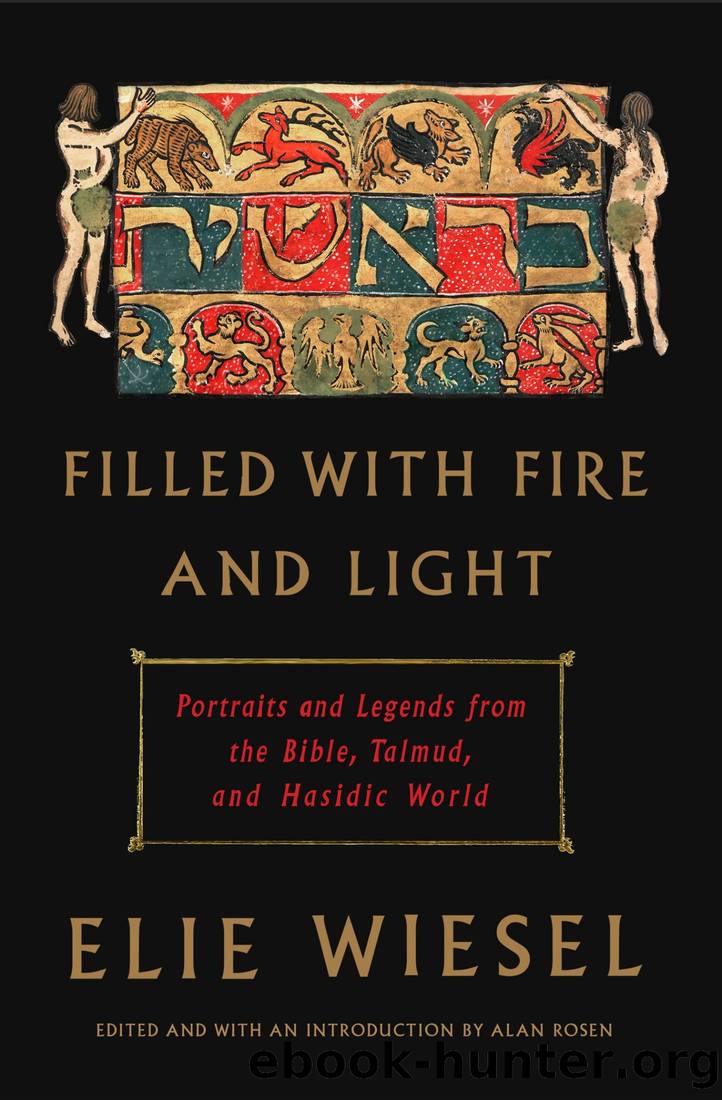Filled With Fire and Light: Portraits and Legends From the Bible, Talmud, and Hasidic World by Elie Wiesel

Author:Elie Wiesel [Wiesel, Elie]
Language: eng
Format: epub
Tags: Biography & Autobiography, Religious, history, Jewish, Religion, Biblical Criticism & Interpretation, General, Judaism
ISBN: 9780805243536
Google: tS9GEAAAQBAJ
Publisher: Knopf Doubleday Publishing Group
Published: 2021-11-15T00:12:29.102523+00:00
At the same time, the king, his family, and his courtiers ate well, lived well. Agrippa II spent his time with Vespasian, Romeâs procurator in Judea. And so did his sister, Berenice, who charmed the procurator with her beauty and her giftsâand succeeded in making his son, Titus, fall in love with her.
When Jerusalem fell it was, ultimately, not because of Roman superiority but because of the Judeansâ internal demoralization. The Baryonim, the Zealots, although brave and patriotic, are not exactly objects of the Talmudâs admiration. Why? Because the dominant viewpoint expressed in the Talmud was that of the pacifists, and also because the rebels did not rise above petty dissensions. When the Romans would let up on their attack, the Zealots would attack one another. Yes, they fought for national sovereignty and dignity, but their tactics were wrong. At one point, they burned all the food supplies in Jerusalem, just to increase the pressure on the population to join in their attack on the Roman army. Mad with hunger, people would become filled with hate toward the enemyâat least thatâs what the Baryonim thought would happen. But it didnât. The hate turned inward, toward fellow suffering Jews. The Talmud is explicit: the First Temple was destroyed because of adultery, idolatry, and violence; the Second Temple, because of sinat hinam, gratuitous hatred. People hated one another, slaughtered one another, for nothing. âNever was a generation so wicked,â wrote Flavius Josephusâwho never missed an opportunity to slander his people.
The Talmud illustrates this with a striking story:
It was because of Kamtza and Bar Kamtza that Jerusalem was destroyed. In those days there lived a man in Jerusalem who decided to arrange a sumptuous dinner. He sent a servant to invite his friend, Kamtza. Instead, the servant mistakenly invited his enemy, Bar Kamtza. When the host saw his enemy in the room, he exploded. âWhat are you doing here?â he said. âYour presence is unwanted. Get out.â âPlease,â said Bar Kamtza, âdo not shame me in public. I came because I was invited. I realize now it was a mistake, but let me stay and I shall pay for my meal.â âNo!â said the host. âGo!â âLet me stay and I shall pay for half of all the meals.â âNo!â âAllow me to stay and I shall pay you for the entire banquet,â pleaded Bar Kamtza. âOut!â shouted the host. And Bar Kamtza was publicly, humiliatingly ejected.
Bar Kamtza took it badly. He said to himself, there were many scholars present and none came to my defense. That means they were accomplices. And so he went to see the Roman emperor and said, âThe Jews are rebelling against you.â âProve it,â said the emperor. âI shall,â said Bar Kamtza. âSend them an offering; let us see whether it will be accepted in the Temple.â And so the emperor gave him a calf for that purpose. On his way to Jerusalem with the calf, Bar Kamtza intentionally wounded its lipâsome say, its eyelidâcreating a blemish that made it unfit for sacrificing in the Temple.
Download
This site does not store any files on its server. We only index and link to content provided by other sites. Please contact the content providers to delete copyright contents if any and email us, we'll remove relevant links or contents immediately.
Harry Potter and the Goblet Of Fire by J.K. Rowling(3051)
Unfinished: A Memoir by Priyanka Chopra Jonas(2918)
Never by Ken Follett(2887)
The Man Who Died Twice by Richard Osman(2301)
Machine Learning at Scale with H2O by Gregory Keys | David Whiting(2295)
Fairy Tale by Stephen King(2073)
Will by Will Smith(2045)
Rationality by Steven Pinker(1768)
The Storyteller by Dave Grohl(1662)
The Dawn of Everything: A New History of Humanity by David Graeber & David Wengrow(1571)
The Dark Hours by Michael Connelly(1571)
The Stranger in the Lifeboat by Mitch Albom(1533)
Cloud Cuckoo Land by Anthony Doerr(1440)
New Morning Mercies: A Daily Gospel Devotional by Paul David Tripp(1337)
Friends, Lovers, and the Big Terrible Thing by Matthew Perry(1335)
The Becoming by Nora Roberts(1332)
Crying in H Mart by Michelle Zauner(1317)
Einstein: His Life and Universe by Walter Isaacson(1315)
A Short History of War by Jeremy Black(1300)
